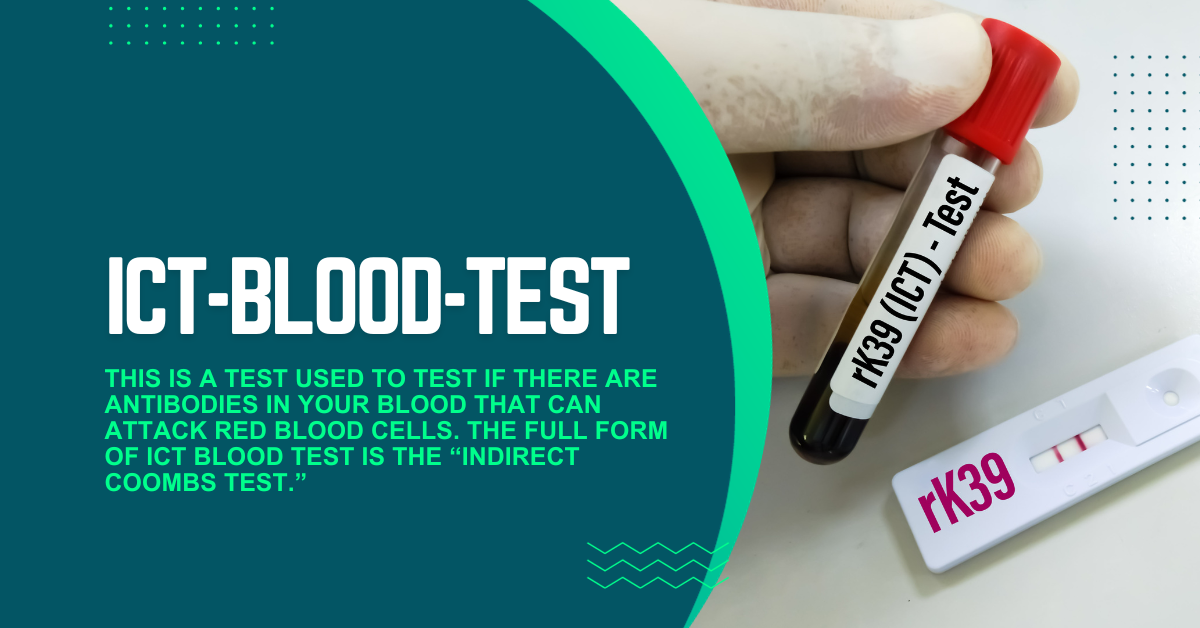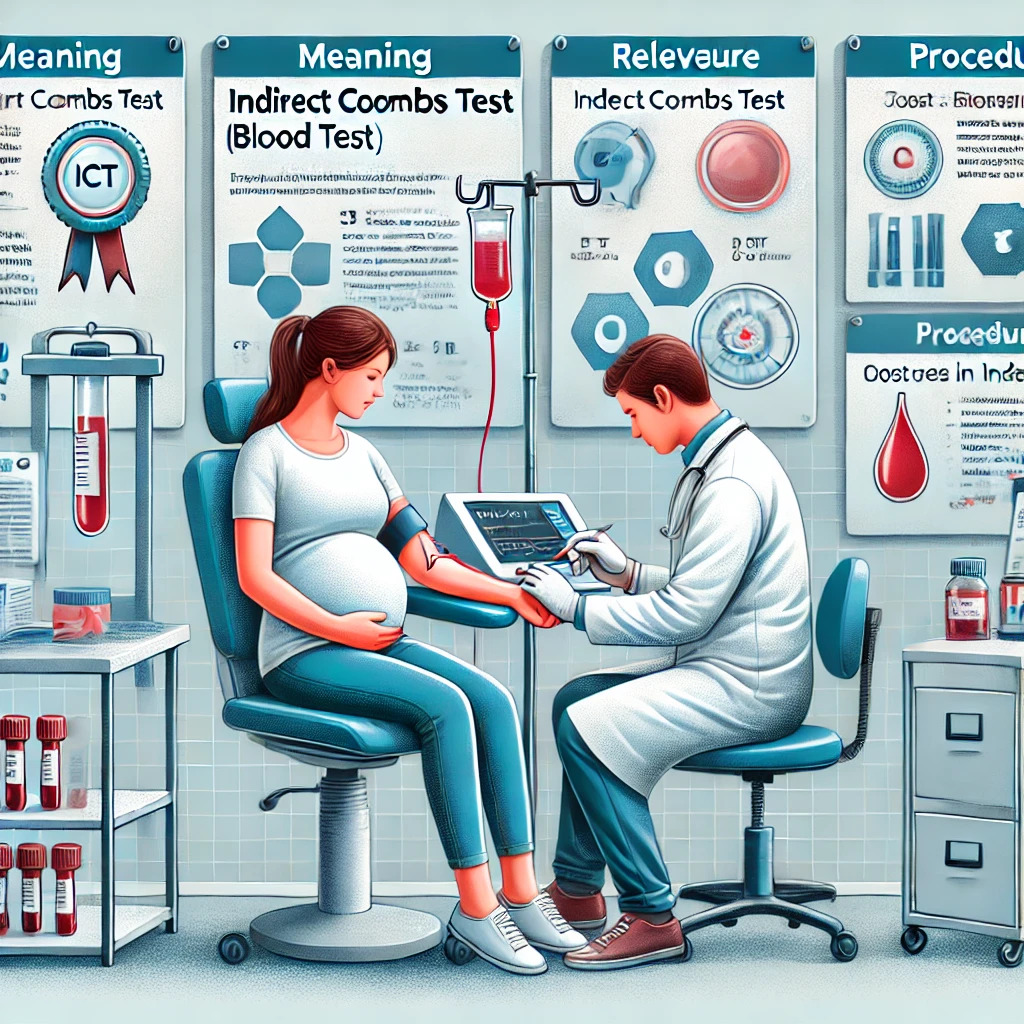ICT Test in Pregnancy: Meaning, Price & Positive Treatment

This test is used to test if antibodies in your blood can attack red blood cells. The complete form of ICT blood test is the "indirect Coombs test."
If the report for this test is negative, it is a good sign.
Let us know more about the ICT Test in Pregnancy, its importance, types, and positive treatment.
What Is An ICT Blood Test?
ICT medical tests are amongst the most critical tests done during pregnancy. It is used to check if there is Rh incompatibility or antibodies against red blood cells in your blood. It contains these antibodies against red blood cells that can attack the fetal blood cells.
A direct Coombs test checks for antibodies attached to red blood cells, whereas the indirect Coombs test or ICT test checks for the antibodies floating in the bloodstream.
The ICT test in pregnancy is used as a screening test before a blood transfusion, during pregnancy, and for prenatal testing.
What Are the Importance Of ICT Tests in Pregnancy
To understand why the ICT blood test is so important, you need to understand the role of antibodies. Antibodies are a part of our immune system to defend our body against infections and other threats.
But sometimes, the immune system may be triggered so that the same antibodies start attacking healthy body cells. ICT blood test is a test against specific antibodies that can attack red blood cells, and it assumes massive importance before and during pregnancy and for blood transfusion.
There Are Two Types Of Coombs Tests- Direct And Indirect.
Here, we discuss the indirect test.
- Indirect Test - The direct Coombs test will check for antibodies attached to the red blood cells, while the indirect Coombs test will be done to see if there are antibodies in the blood that can connect to the red blood cells.
What Is the ICT Test In Pregnancy?
An indirect Coombs test is critical in pregnancy and is among the tests used for prenatal checkups. You might have heard about the Rh factor and Rh compatibility test. ICT medical test is done for all pregnant people because it is essential to check if a pregnant person has antibodies against Rh-positive blood.
What Is Rh-Positive Or Rh-Negative Blood?
There are two crucial blood grouping systems- ABO and Rh systems. When your red blood cells have the Rh protein on their surface, you are Rh-positive.
You can be A+ve, AB+ve, O+ve, or B+. When you don't have the Rh protein, your blood group will be A-ve, B-ve, AB-ve, or O-ve.
If someone is Rh-ve but the fetus happens to be Rh+ve, as the husband might be Rh+ve, the body is sensitized, meaning the immune system sees this Rh factor as a threat and makes antibodies against it. This is an inherited factor. An Rh-ve mother and Rh+ve father can have both Rh-ve and Rh+ve babies.
First-time pregnancies where an Rh-ve mother carries a Rh+ve fetus are generally not affected as enough antibodies don't get generated to cause any damage. But when the second pregnancy happens with a Rh+ve fetus, the antibodies that are already present in the body will attack the fetus.
This is a serious issue where the baby can have jaundice, anemia, or more severe symptoms.
The ICT test in pregnancy can detect this issue, and you can be treated for this, which will keep the baby safe. A negative test result is excellent news because it means you don't have antibodies that can attack red blood cells.
A positive test means you have antibodies and will need further testing. Based on the results, you may need treatment.
Even for blood transfusion, the donor and receiver must be compatible. A negative ICT test would mean there won't be a reaction to the blood transfusion, which is good news.
How Is The Done ICT Test In Pregnancy?
This test is done by taking your blood sample, for which you don't need to fast or do any special preparation. The results are available in around 24 hours or less.
People with a negative test report can infer it depending on their needs, as
- Safe to get a blood transfusion
- Due to Rh sensitization, you don't need to worry about any issues during this pregnancy.
A positive indirect Coombs test does not always mean that the fetus will have any problems. Many types of antibodies can exist, but not all will attack fetal red blood cells.
This is why a doctor must make all diagnoses. You might need additional tests after a positive ICT test to determine if you need any treatment to protect the baby.
If you need treatment, this means that the baby is in danger of developing hemolytic disease of the newborn. Therapy such as intrauterine blood transfusion, Rh immune globulin, and corticosteroids can be used based on the needs and response to the treatment.
When Can An Indirect Coombs Test Come Positive in Pregnancy?
There are many situations where this test can come positive.
Some of the causes for a positive ICT blood test in pregnancy are:
- The most typical reason is that the blood types of mothers and babies differ. The mother develops antibodies against the baby's blood cells. These antibodies may be formed during an earlier pregnancy, due to blood transfusions, or due to injection of Rh immune globulin.
- If the mother has autoimmune diseases like RA, Lupus, etc, this can also trigger the immune system to attack the baby's blood cells.
Conclusion
ICT medical test is an essential test before blood transfusion and during pregnancy. While negative results rule out immediate danger, a positive impact does not always mean that there is an imminent threat.
It should always be left to medical care providers like physicians, gynecologists, and other doctors to interpret the tests, carry out further testing, administer treatment, and monitor the response. There are treatments available for those whose positive results mean that there is a definite problem.
At O-Lab, we offer comprehensive tests for pregnancy, antenatal tests, and general health checkups. Timely results, accurate reporting, reasonable prices, and an empathetic approach set us apart from other labs.
The ICT test in pregnancy price can range between INR 400-800 depending upon the city and lab.





